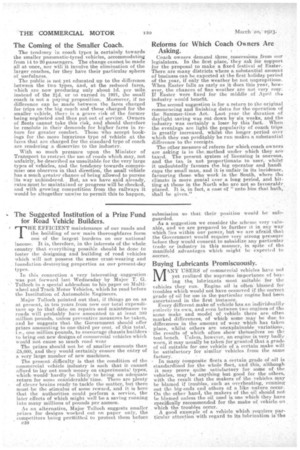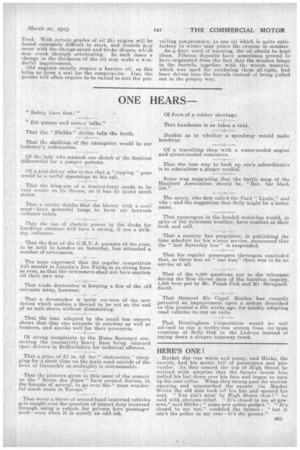. The Suggested Institution of a Prize Fund for Road Vehicle Builders. .
Page 2

Page 3

If you've noticed an error in this article please click here to report it so we can fix it.
1 HE EFFICIENT maintenance of our roads and
the building of new main thoroughfares form one of the large.st burdens on our national income. It is, therefore, in the interests of the whole country that everything possible should be done to foster the designing and building of road vehicles which will not possess the same crust-wearing and foundation-destroying properties as our present-day types.
in this connection a very interesting 'suggestionwas put forward last Wednesday by Major T. G. . Tulloch in a special addendum to his paper on Multiwheel and Track Motor Vehicles, which he read before the Institution of Automobile Engineers.
Major Tulloch pointed out that, if things go on as at present, in ten years from now our total expenditure up to that date. on repairs and maintenance to roads will probably have amounted to at least 300 Million pounds, unless preventive measures betaken, and he suggests that the Government should offer prizes amounting to one-third per cent. of this total, • i.e., one million pounds, to encourage chassis builders to bring out new designs of commercial vehicles which would not cause so much road wear
The prizes should not be of smaller amounts than 25,000, and they would certainly ensure the entry of a very large number of new machines.
The present difficulty is that the condition of the commercial vehicle industry is such that it. cannot afford to lay out much money on experimental types, whicha would' hardly be likely. to bring an adequate return-. for sonic considerable'time. There are plenty of clever brains ready to tackle the matter, but there must 'be the stimulus of some reward, and it is here that the authorities could perform a service, the later effects of which might well be a saving running into many millions of pounds per, annum. • As an alternative, Major Tulloch suggests smaller prizes for designs worked out on paper only, the competitors being permitted to protect them before 010
submission so that their position would be safeguarded.
As a suggestion we consider the scheme very valuable and we are prepared to further it in any way which lies within our power, hut we are afraietthat the Government. would require very strong pressure before they would consent to subsidize any particular trade or industry in this manner, in spite of the manifold advantages which might be expected to
accrue. .
Buying Lubricants Promiscuously.
MANY USERS of commercial vehicles have not yet realized the supreme importance of buying the, lubricants most suitable for the vehicles they run. Engine oil is often blamed for troubles which would not have occurred if the correct grade of oil for use in the particular engine had been ascertained in the first instance. Every different make of vehicle has an individuality entirely its own, and even between two engines of the same make and model of vehicle there are often marked differences, of which some may be due to differences in the amount of wear which has taken place, whilst others are unexplainable variations, the results of which often show theinselves on the test bench. Unless, however, an engine is very badly worn, it may usually be taken for granted that a grade of oil suitable for one vehicle of a certain make will be satisfactory for similar vehicles from the same
factory. •
, In many eomposite fleets a certain grade of oil is standardized for the whole fleet, and this, although it may prove quite satisfactory for some of the vehicles, may be anything but good for the others, with the result that the makers of the vehicles may be blamed if troubles, such as overheating, running out the big-ends and others of a like -nature_ occur. On the other hand, the makers of the oil should not he blamed unless the oil used is one which they have specifically recommended for the make of vehicle, on which the troubles occur. A good example of a vehicle which requires particular attention with regard to its lubrication is'the
Ford. With certain grades of oil the engine will be found extremely difficult to start, and trouble may occur with the change-speed and brake drums, whleth may crack through overheating. In such. cases a change in the thickness of the oil may make a wenderful improvement, Old engines usually require a heavier oil, as this helps to form a seal for the compress:on. Also, the grades will often require to be varied to suit the pre vailing temperature, as one oil Which is quite satisfactory in winter may prove the reverse in summer. As a final word of warning, the oil should be kept clean. Fibrous deposits have sometimes proved to have originated from the fact that the woo.den.bungs in the barrels, together with the woven materiai which was used for rendering them oil-tight, had been driven into the barrels instead of being pulled out in the proper way.




















































